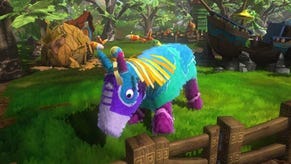Viva Piñata: Trouble in Paradise
Refilled with fun.
It's on Xbox Live, too, with support for up to four players. Once they're in, you can see their cursors moving around, donate money to them and boot them out if they get annoying. "We got to the stage where we couldn't fit it into the first game in the time," Cook says of the four-player online mode, but that preliminary work means it's fully featured for Trouble in Paradise, allowing you and up to three friends to play collaboratively through the entire game, or just drop in and out. You can set their levels of interactivity, so if you have a stranger visiting they can't tear up your hard work. "It's great if you've got a more experienced person coming to visit your garden because the garden uses their experience level rather than the host's," Cook says, "so you'll see things you wouldn't normally see until later in the game. New things will open up. And it has that cool thing: you've built a disco in one corner and a beach at the other end, and you just want to show people and let them have a wander around."
And whereas the first game was very much a slog at times for the developer, this was more fun for the small Rare team given 18 months to figure it out. "It was a very different experience having a game that would run consistently from the day we started to the day we finished," says Bryan. It enabled Rare to doss about. Hence the talent show ("P Factor"), accessible from the X-button radial menu, where a panel of judges made up of the game's humanish characters rate your piñata based on the things they like: fancy accessories, a history of victories in the racing mini-games, and so on. Elements like the talent show also allowed the team to make use of leftover assets from the original game's extensive development. "We were going to have experts for each type of animal - lizards, mammals, etc. - and all the characters were done for those," says Cook, "so we used them."

The Trick Stick, another X-button menu tool like the shovel or watering can, is another add-on born of fun and frolics. Each animal has two tricks that they will perform when they eat a certain item, and if you tap them with the Trick Stick as they're doing it, they learn the trick and can then perform it whenever you tap them thereafter. Achievements, too, are geared towards fun. "You can hit the sweets with the shovel and play a little golf game. They go in the holes and you get a little cheer and coins come out. There's an Achievement for doing that. Achievements are a great way of pointing people to things they might not have noticed," says Cook.
Plus of course there's the vaunted Xbox Live Vision USB camera link-up. "That was Will's invention," says Cook. "He literally came to us and he said, 'Right, I've got this code, here's the camera, it'll do this - do you think we can use it?' and it's like, 'Of course!'" Rare's not exactly sure how the cards will be distributed yet, but we get to play with them anyway. They're the size of playing cards, and when you hold them up to the camera a little video window pops in from the right side of the screen, focuses and then a second later the animal encrypted into each card's unique code materialises in the game world, complete with a specific name and accessories. "So much of that stuff, like the disco paving was just like, 'We've got this paving - why don't we make it change colour like a disco floor?'" says Bryan.

It's all good for fans, then, but the big question is whether this can make up for the original game's flaws: a lot of dead time, a fiddly interface, and the odd repetitive mechanic. Otherwise genuine crossover appeal will remain elusive. According to Bryan, the problem last time was simple. "We'd be looking at a specific feature for a specific period of time, and therefore the actual fact that you might have to do that a hundred times before you finish the game is completely irrelevant to somebody who's developing it - up to the point they're at home playing it and the wife says, 'This is really annoying.'" Much as it pains us to say it, there are signs of that happening again in the early stages of the main game: frilly menus and flashing prompts and lights all over the place, lots of screens to work with, and the potential to get lost before you find the fun.
Rare's confident though. "I think it's...I actually enjoy playing it a lot more than the first game," says Cook. "And I'm hoping that other people find that too."
Viva Piñata: Trouble in Paradise is due out on 5th September. Look out for our review very soon.




